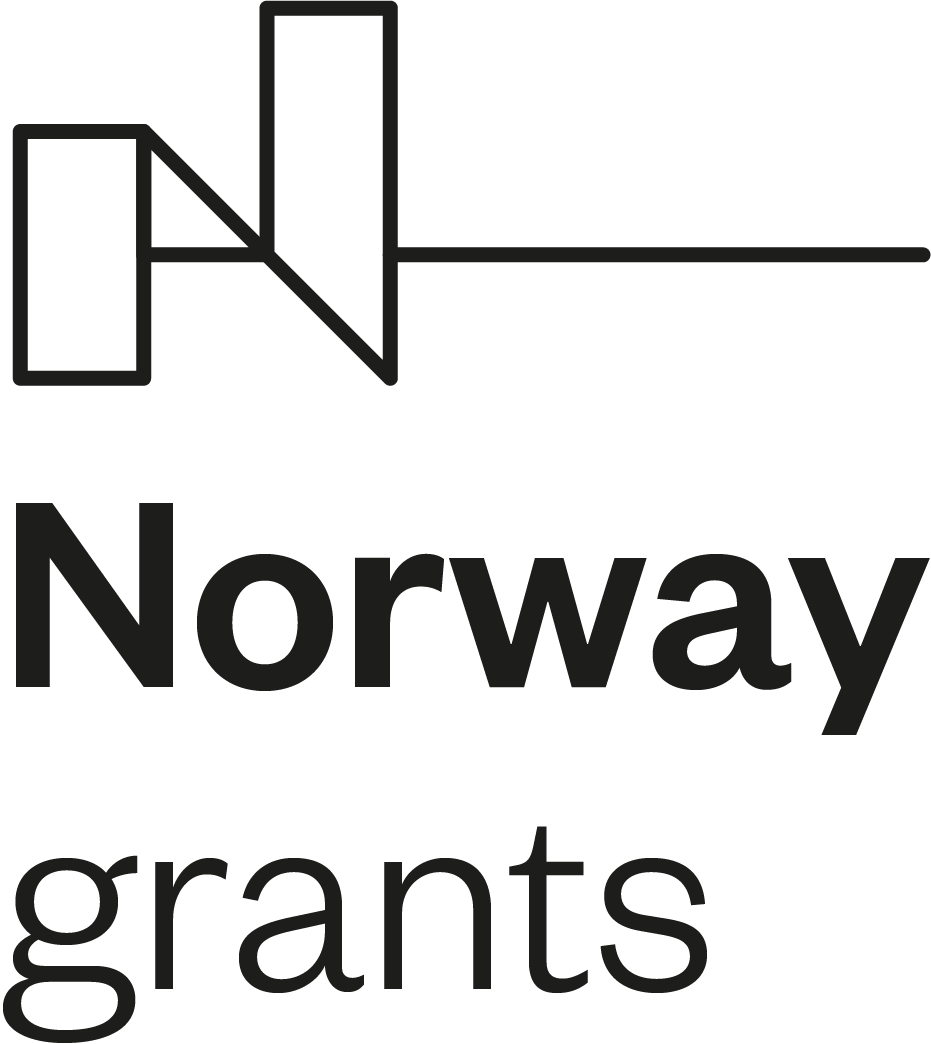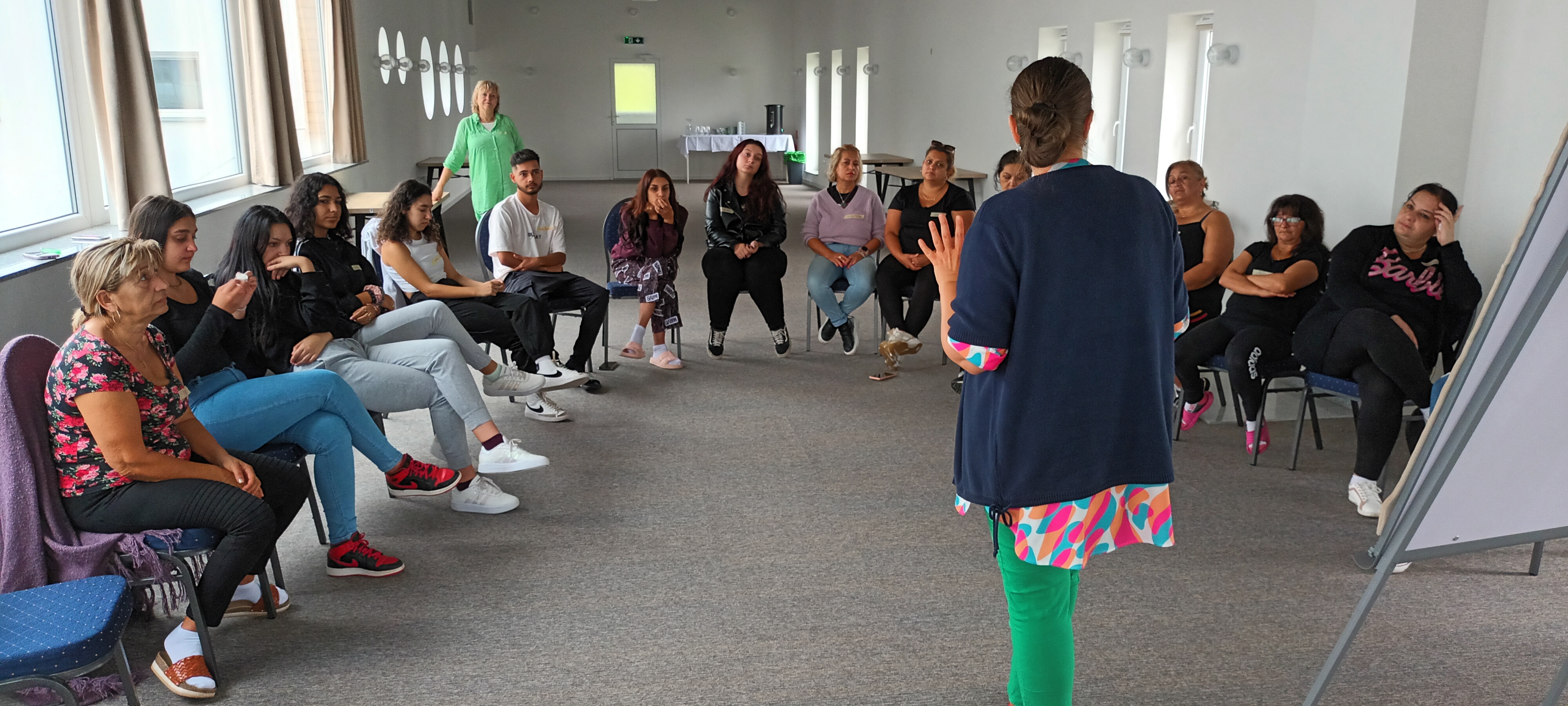the ones we were waiting for 2 - roots.utopia.sk

The ones we've been waiting for (Part 2)
Report on the ÚRMC

Peter Vittek and Eva Riečanská from the association Utopia in 2020 have published a report that describes in detail the beginnings and activities of the Union of Roma Maternity Centres. The text was the result of many conversations and several years of cooperation between Utopia and the URMC. It gives us a glimpse into the world of Roma women activists in their efforts to "uplift the Roma woman". Several of the Union's activities later became the basis for the project "Emancipated Roma Women Fight Discrimination". In the report, you will find many answers to the question of why we sought support for them together and tried to find a way for them to become sustainable. You can read part 2 below.

Activists of ÚRMC at a workshop in Banská Bystrica.
In the first part of the report, we learned how Marie Oláhová and Beáta Berkyová, through their work with children in folklore ensembles, came to work with their families and eventually with entire Roma communities, and how their efforts to "uplift Roma women" led to the founding of the Union and the systematic struggle against domestic violence.
The dream of recognition
"We talked about the fact that the non-Romani people don't accept us yet and that we want to fulfill our dreams. We realised that we lacked sufficient education to be socially recognised," Beata recalls of the discussions at the beginning of the Union. They started talking about what she wanted to do and helping each other to complete her education. Some got their high school diplomas, others started college. Education opened doors to positions they could not otherwise hold. They are also persuading other women to complete their schooling. At the same time, they are trying to persuade the authorities to create jobs for women with less education. For many of them, for various reasons, higher education is out of reach, but they need jobs anyway. These women can be particularly capable counsellors and become an effective bridge between the municipality and the community. The Union has a good relationship with most mayors and offers to help them solve problems. They always know who to turn to. Marcela Balogová, who has only recently graduated from high school, has been employed by the municipal office in Málinec. "The mayor often calls me into his office and asks me what I know about certain problems and what he can do," she says.
At the time when Beáta started studying social work at the university, the municipal office announced a selection procedure for the position of field social work assistant. "The women encouraged me to give it a try. They said at least someone would be in the office for us and we would be closer to information." She was successful in the selection process. After graduation, she was able to work as a field social worker. And later, her education enabled her to get a job at a community centre, where she could finally devote herself fully to working with children, young people and their mothers.
Stolen institutions and elites
Sometimes higher education requirements are a barrier to achieving quality outcomes from public institutions. Meeting formal criteria is more important than the results achieved. Marcela's dream is to work at the Community Centre. "The children in our centre have no respect for non-Roma women at all and do whatever they want with them. And it is clear that they are there only for the salary. They do what they have to do, but otherwise nothing. In Poltár, the community centre used to do camps every year. So I asked why they don't do them in Málinci too. And last year we suddenly had a camp too. I have already told everyone to make an exception and employ people without the required education. After all, experience is the best school." To make her dream come true, however, she'll have to supplement her education. Several long-time activists from excluded backgrounds experience a similar situation. Neither their years of experience nor their achievements outweigh bureaucratic formalism. The founder of the Union, Marie Oláhová, is in a similar situation. She has been doing community work in Detva for more than thirty years, but the municipal office is unable to offer her an adequate job position.
Of course, the national projects Field Social Work and Community Centres, which are the main targets of this criticism, are not the only bastions of bureaucratic formalism. Beáta recalls several situations where poorly set conditions prevented them from getting involved in projects that could have helped children in the district: "They couldn't understand our situation. They said that only children from Poltár and not from the catchment area could be in mentoring. We were happy when two Roma got into the ninth grade. But there was only one from Poltár. The other was from Rovniany. I could only work with the one from Poltár and I couldn't help the others. In the surrounding villages there is no school or only the first grade of primary school. A lot of our projects get away from us just because they are badly set up. Everyone wonders why the children do not study. They say they have lots of opportunities, scholarships and so on. But many forms of support are unusable for us. At the Ministry of Education, we said that compulsory schooling should be compulsory until the third year of secondary school, so that pupils leave school with at least a certificate of education. For years they have been leaving the first year, because that is when compulsory schooling ends. We've been dealing with this for years, and nothing."
The women of the Union do not hesitate to use all available options to improve the situation in their villages. When public institutions have failed, they have also turned to the Roma elite for help. Beata compares the experience she gained during her study trip to the United States with the situation in Slovakia: "Who will help us if the Roma intelligentsia turns its back on us? People's fates are destroyed by trivial things. Young boys go to prison for utter stupidity. We don't have a single Roma lawyer to represent them. We have no one to turn to because they all take big money. We talk about cases from practice, but nobody listens. When I was in the United States, I really liked the fact that intellectuals from poor and excluded communities were fighting for their people. Here, it is often the case that once the Roma become part of the elite, they no longer speak up for us. They still say that they came from poor circumstances, from the settlements, and that they understand people's problems, but these are just words. One very well-known Roma lawyer told me the last time I was looking for help for a client that she was not involved in law and that she would have used Google if she were me. Why, then, does she still claim to be a lawyer and a representative of an anti-racism organisation? And a Roma person who is experiencing racism gets that answer instead of help? Like when the boys from Moldava turned to Peter Pollak, but in the end had to be represented by a lawyer from Brussels."
The Office of the Government Plenipotentiary for Roma Communities does not have a good reputation among the activists either. It often happens that it looks for compromises where it should stand up for Roma women and Roma people. Whether it is disputes over housing or the use of public space, the efforts of the Office of the Plenipotentiary to be neutral effectively force women activists to give in in situations where giving in is impossible. The decontextualised appeal to non-confrontation in many cases contributes to the perpetuation of oppression and exclusion and should be unequivocally rejected. Beáta can talk for hours about concrete examples: 'We were dealing with problems in a school where the teacher regularly attacks pupils. She tells them that they live off her money. The headmistress declares that 'Gypsies won't walk through the yard'. We had witnesses to this, and written evidence. When we contacted the Office of the Commissioner, they wrote back to us telling us to calm down and find a reasonable language with them. That we shouldn't pick a fight with the headmistress of the school."
The result of the failure of institutions and elites is pressure on women activists to enter big politics themselves and try to change the situation "from above". However, Marie and Beata always reply that if they too leave, there will be no one to work with the people in the communities and the results of their years of effort will come to naught. And no other source of change for the better is anywhere to be seen.
The fight for self-government
Ahead of the last local elections, some Union women decided to try and persuade other members to stand for local and city councils. They told themselves that they were already doing municipal politics anyway, so why not give it a try. And in the councils they would have more influence in shaping it. The Union managed to mobilise a group of twelve women. They worked with them for half a year, preparing them for the elections. Potential female councillors learned all about the powers and responsibilities of elected women representatives on city councils. Although initially apprehensive, in the end most of them decided to give it a try. They wanted to make a difference. Only two of them did not run. In one case, the candidacy was prevented by Roma men who could not accept that a woman from their community would become a deputy. At least they stood themselves in the end. In the other case, the husband's health problems prevented him from standing. However, ten women stood in the elections. And they ran in ten different communities. No one has ever attempted anything like this in Slovakia.
In the end, only one of the women was successful. "My daughter," says Erika Vyhrabáčová. "She enjoyed it despite the challenges. They threatened her. She was getting anonymous text messages. But she didn't give in." At eighteen, she became the youngest deputy in Rovnany. Many people in Rovňany vote for Kotleba, so it was a surprise. And apparently she got votes from the non-Roma as well. "She is on the council, on the culture commission and in charge of the library. She had enough of that, so the women chose me as the representative of Rovnian in the Union. I always tell her what we do at the meetings. We are a team," she adds. For most of them, however, the candidacy itself was a victory. They overcame their fears and ventured into uncharted ground. Despite the setbacks, several have taken up jobs on council committees or in offices and hope to use their experience of running and working for local government in the next election.
Equality is born slowly and in daily struggles
In the end, the effort to "uplift the Roma woman" has far more fundamental and complex implications than many people would expect. At the same time, an improved quality of life for women means a better situation for their families. Change is also taking place in the wider community. Most of the time it looks quite subtle and not immediately noticed by everyone. Often it is because it only becomes apparent after a long time. It is not only linked to the activities of the Union, but is also linked to other activities of its members. "I can see it, for example, in the way the children I had in the ensemble bring up their children," Beata points out. "I raised a lot of youngsters. And even though some of the first generation of my girls didn't go to high school, they got married very early and had children, I see them trying to get their daughters to learn and go to high school. Some have told me directly that they don't want their daughters to get married as young and tie themselves down too early to children and family. I now have twenty kids in my ensemble and ten of them are in high school. It wasn't like that before. We enjoyed every ninth grader. Many ended up in sixth or seventh grade." The younger kids see that their older friends and girlfriends are in high school. Today, they have role models in their neighborhoods who can inspire them. But active UU women are also an inspiration. "Some of the girls shout after Beata every now and then that she should retire, that they will be the ones in charge," Anna laughs.
Many changes may seem insignificant or uninteresting to outsiders, but they play an important role in local life. They reflect a shift in everyday relations between people and in the breaking down of Roma-Ner Roma stereotypes and prejudices. A good example are the public events of the town of Poltár. Today, Roma people have no problem going to sit among non-Roma on a bench or buying goulash or other refreshments. According to Beata, these small changes clearly show that the situation in the town is improving. The Roma have always kept to themselves. And to take food from a non-Roma, they were prejudiced against that. Maybe even more than the non-Roma had prejudice against them. Now I see that they have no problem going into a restaurant and ordering. It may sound strange to some, but we who work with these people see a shift for the better. For example, also in the fact that a mother can advocate for her child in school. She doesn't withdraw. She speaks her mind. We see an increase in self-esteem." Gradually, the perception of the majority is also changing. "Mostly we have taught people in the city that we cannot blame individuals for their behaviour. They can't think that if one of us does something, we're all bad. We made them think that there are differences between families and between Roma."
P. S.: After the outbreak of the COVID-19 pandemic and the introduction of measures to restrict physical contact, the women of the Union mobilised their members in Poltár and together sewed veils, which they then distributed to people in the town. They took their other activities to the virtual space and help each other and keep in touch in discussions on social networks.
The second part of the report was first published on 7 May 2020 in the monthly magazine Kapitál.
Translated by deepl.com. Not edited.